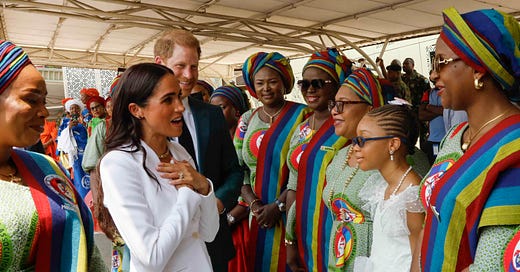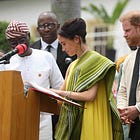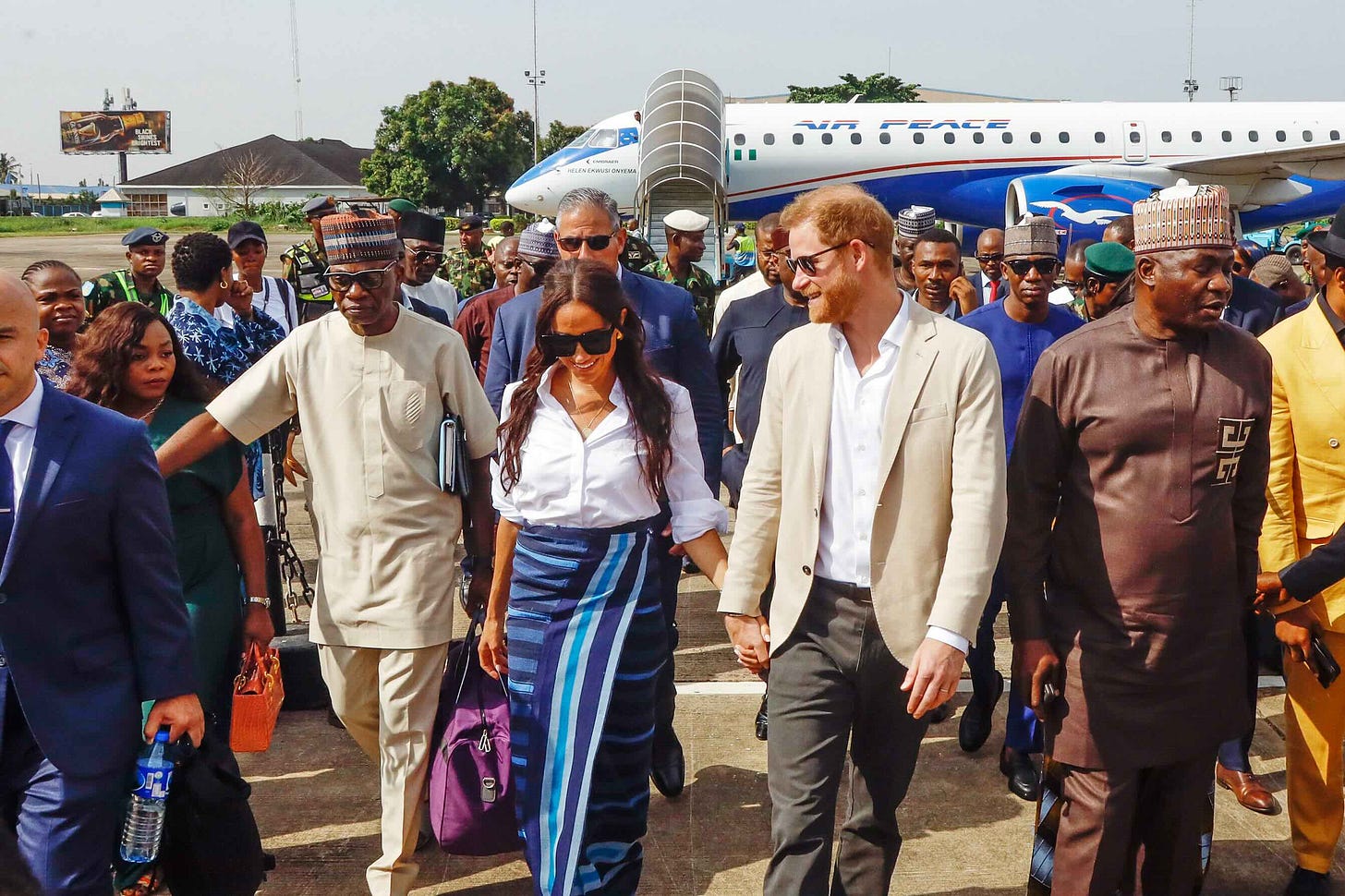Adebola Olayinka on How Harry and Meghan’s Trip to Nigeria Was ‘Like My Country — Complicated’
‘There’s an undeniable joy in witnessing our cultural contributions embraced and reflected back to us.’
Hello! I am wrapping up coverage of the Sussexes in Nigeria with a guest essay from Adebola Olayinka. She is a longtime royal watcher and first generation Nigerian American with a master’s degree in international relations from the University of Chicago as well as a master’s degree and PhD in public policy from Duke University. She wrote an excellent piece for So Many Thoughts following the coronation (which you can read here). I love how she embraces complex and, at times, competing feelings.
Below, Ade reflects on the three days Prince Harry and Meghan, the Duke and Duchess of Sussex spent promoting the Invictus Games in Nigeria. There were times Ade found challenging, including the posed photos with military officials, as well as many moments to celebrate. Fashion held particular significance, she writes: “There’s an undeniable joy in witnessing our cultural contributions embraced and reflected back to us.”
Thank you for your support of So Many Thoughts, which makes it possible for me to do this work and pay contributors! If you haven’t already, please consider upgrading for $5 / month.
Adebola Olayinka on How Harry and Meghan’s Trip to Nigeria Was ‘Like My Country — Complicated’
I am a first-generation Nigerian-American born and raised in the United States. Both of my parents are from Ekiti State in Southwest Nigeria, and I grew up surrounded by a diverse Nigerian community. To be Nigerian is to live in contradiction — it is a wonderful, beautiful, and complicated country.
On one hand, we are a nation (and a diaspora) in crisis. Nigeria is currently dealing with extreme inflation, leading to increased poverty, hunger, and crime. We are also seeing increased authoritarianism, ongoing political scandals, and unnecessary culture wars between people and pop stars.
Even amidst ongoing crises, Nigeria’s vibrant life and culture shine through. Our nation is a rich tapestry of 237 million people from 370 tribes, each with a thriving, beautiful culture of its own. Our music, films, art, and fashion increasingly garner global recognition. Nigerians, both at home and in the diaspora, are deeply proud of their roots.
This pride often manifests in claims of cultural ownership. For example, despite scholars’ belief that jollof rice — a popular West African dish — originated in the 14th century Wolof Empire that spanned parts of today’s Senegal, The Gambia, and Mauritania, Nigerians claim to have the purest and best jollof rice in the world (more fact than claim, but perhaps I am biased).
“Not only did we claim her, but she also seemed to be enthusiastically claiming her Nigerian roots, too.”
Similarly, after Meghan discovered her Nigerian ancestry many people were excited! It was not about material gain; we understand her ancestry will not boost our economy or win our Super Eagles a World Cup. It was about a sense of pride and connection. Twitter users gave her names from different cultures and Photoshopped her likeness into our attire. Meghan’s support for Team Nigeria during the 2023 Invictus Games further ignited this excitement. Not only did we claim her, but she also seemed to be enthusiastically claiming her Nigerian roots, too.
The anticipation tied to the announcement of the Sussexes’ Nigeria visit was tangible. I texted fellow Nigerian-American royal-watching friends in excitement, sharing “Meghan will be overwhelmed by the love” with one friend.
“She won’t know what hit her,” my friend responded. We knew they would be met with incredible fervor, and that there would be a deluge of new photographs — a welcome change from the normal Sussex image drought.
The pictures were plentiful and optics became a large part of the discussion. Some segments of global media focused on the merits and dangers of a “royal-style” tour by non-working royals. Most of that conversation struck me as silly. I thought it was good to see the Sussexes and a bittersweet reminder of what could have been had the Firm fought to keep them in the fold.
My thoughts kept coming back to how the trip was — like my country — complicated. At times we saw the Sussexes in their element, dancing with kinder-age children before talking about the importance of mental health and urging them to check in on each other. Harry looked comfortable sharing stories with his fellow veterans and playing sitting volleyball, while Meghan appeared energized championing women’s empowerment alongside Dr. Ngozi Okonjo-Iweala. It was particularly powerful seeing the Sussexes visit with three Nigerian kings. Gatherings of multiple kings are generally very special moments, and the fact that they honored Meghan in particular with a visit and a naming ceremony was sweet.
Other moments gave me pause. Their final polo engagement felt out of touch for the average Nigerian. Polo is a sport for the super rich. While it was a Team Nigeria fundraiser for Invictus, the optics did not align with the larger visit during a cost of living crisis globally and in Nigeria.
For me, the most challenging portions of their trip were with Ministry of Defence officials. While it made sense for them to meet the institution that invited them for Invictus promotion, images of Harry and Meghan accompanied by Nigeria’s highest ranking military official turned my stomach.
Between 1966 and 1999, the nation was largely ruled by a series of military dictators. I associate the military with my first visit to Nigeria in 1997 during the time of General Sani Abacha, our last and most ruthless dictator-president. I have vivid recollections of military checkpoints and the palpable atmosphere of fear. I also thought about more recent incidents, such as the October 2020 military intervention of protests in Lagos, the commercial capital and most populous city. Interactions with the military became deadly as youth protested against the “Special Anti-Robbery Squad” that was engaging in profiling, harassment, and extortion of young people. It was a harsh reminder of the tenuous relationship between civilians and the military.
I view the Sussexes as compassionate people who are thoughtful about their impact and their image, so their association with this institution felt far removed from what they stand for. While I understand that Invictus necessitates Harry and Meghan meeting with military leaders, the optics were unpleasant for me.
As the tour unfolded, in the chats I was having and the social media commentary I kept tabs on, I found a fair number of Nigerians expressed similar concerns. Others shared anti-Commonwealth views, while some simply did not care about the Sussexes or their trip.
The one thing the conversations kept coming back to was the fashion. Fashion is an important part of Nigerian life. Clothing reflects the nation’s cultural diversity. Nigerians are known across the continent for our colorful attire, particularly the various types of traditional formal wear that are worn to church, parties, or weddings. Furthermore, contemporary Nigerian designers are increasingly garnering recognition as our industry secures a global foothold.
I was curious how Harry and Meghan would embrace elements of Nigerian attire into their wardrobe throughout the trip. There were show-stopping moments of diplomatic dressing on Days 1 and 2. Nigerians immediately noticed the Sussexes’ intentional side-by-side suits in our national colors of green and white. There was another heartwarming and smart fashion moment when Meghan wore a gorgeous red dress from Oríré, a small, contemporary, female-founded Nigerian brand.
These choices were noteworthy, yet they did not hold a candle to witnessing Meghan and Harry in traditional Nigerian attire. We were first treated to an image of Harry in a cream colored agbada (a loose fitting kaftan pullover that is standard in Nigerian men’s formalwear). It was nice to see him embrace our clothing and it gave me hope that we might see Meghan in traditional clothes as well — which we did, on Day 3.
I lost it as my Instagram feed was flooded with images of the duchess in a white button up accompanied by an iro (a wrap skirt made out of a hand-woven material called aṣọ òkè). “Babe! Babe! Look!” I exclaimed to my sweet fiancé — who was born and raised in Nigeria, does not care about anything royal, and who unwittingly enrolled in an unrequested yet lifelong course on the British Royal Family when he met me.
He was impressed. “She’s killing it,” he said quite seriously. “She looks smashing.” I had a similar ecstatic reaction when I saw her in the yellow dress and ìpelè (the shoulder sash also made out of aṣọ òkè).
“It was heartening to see our culture celebrated on a global platform.”
These are clothes that we wear regularly. Just two weeks ago, my entire family wore our own agbadas, iros, and ìpelès for a fresh set of family pictures. I am also in the early stages of wedding planning, and soon I will be selecting the aṣọ òkè that I will be wearing for my traditional wedding ceremony. The images of Harry and Meghan are fun additions to my traditional clothing cannon, alongside memories with my family and community.
Reflecting on this with my fiancé, we marveled at Meghan’s genuine show of effort and goodwill. Beyond her impeccable styling, it was heartening to see our culture celebrated on a global platform. While we do not require validation from non-Nigerians to affirm the value of our culture, there’s an undeniable joy in witnessing our cultural contributions embraced and reflected back to us.
In some ways, the Sussexes trip to Nigeria was solely for Nigerians. We had the cultural context to adequately interpret and appreciate each significant, celebratory gesture. However, there were segments of the non-Nigerian media and social media that tried to speak for Nigeria, claiming that Nigerians were scandalized by Meghan’s strapless and backless dresses. While Nigeria may be more culturally conservative than many Western nations, both modern and traditional Nigerian outfits often exhibit similar features. It’s incorrect and patronizing to suggest that Nigerians are unfamiliar with these styles. This negative commentary made me wish certain moments could be preserved solely for Nigerians to appreciate.
Ultimately, the Sussexes’ visit was witnessed globally as their images were pervasive on global news and social media. People did not need an in-depth understanding of their visit’s purpose or itinerary to interpret their photos in Nigerian attire. For me, these images cement two enduring narratives of their visit: Meghan celebrating her ancestry and the nation’s joy in welcoming two people who embraced every moment of their time in Nigeria.
My thanks to Ade for sharing her insights! You can find her on Instagram at @TheAdeOlayinka.
ICYMI: My so many thoughts — or SMTs, for short — on all eight of the looks Meghan wore for public engagements can be found here, with links to the pieces she wore gathered here.













Elizabeth, Thank you for continuing to champion and uplift different voices on your platform. ❤️Big thanks to you Adebola!
I really appreciated hearing Adebola's perspective on this, particularly the conflicting elements. It's important to reflect on the challenging moments as well as the celebratory. Thank you to her for sharing her thoughts & to you, Elizabeth, for sharing your space so we could hear her thoughts.